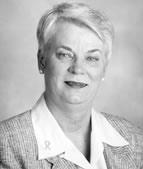

 Ovarian
Cancer Survivor
Ovarian
Cancer Survivor
Ginger Ackerman Smith
The first and most important thought I would like to express to you is that
every single day is important and worth living like it is your last. If there
are any gifts from cancer (and there are several), it is the ability to focus
on and prioritize what is most important to you. If you are a member of a gynecologic
support group, which I recommend, you will have the opportunity to meet and
become friends with some of the most courageous and impressive women on earth.
I was diagnosed with advanced ovarian cancer in January 1997. After the initial
shock, when I began adjusting to life as an ovarian cancer survivor -- and you
are always a survivor until you die -- I began to look for ways to deal with
my new persona.
My diagnosis of ovarian cancer had been a fluke. My mother had died of breast
cancer and cancer was extremely prevalent in her family, so I was always very
careful to get mammograms, eat the "right foods" and read all the latest information
about breast cancer. Unfortunately, I didn't know about the very strong connection
between breast and ovarian cancer. When I had the opportunity to take a CA 125
blood test for ovarian cancer at a local YMCA (yes YMCA) health fair,
I jumped on it because it was such a bargain at $40.
I would never have thought in a million years that I might have ovarian cancer.
When the blood test came back elevated at 101 (35 or less is normal), I panicked
and rushed to my OB/GYN who pooh-poohed the whole situation. I tell you this
not to frighten you about OB/GYNS, but to let you know that you are your own
consumer advocate and must be responsible for your health as well as other interests.
The physician was actually following exactly what had been taught in medical
schools as late as five years ago; that a CA 125 blood test was almost never
valid and elevation could be caused by many conditions such as endometriosis,
etc. This is true, but it is also true that it is a strong indicator for ovarian
cancer in post-menopausal women. No one felt any worse about my eventual diagnosis
than my physician. My own lack of knowledge about ovarian cancer and its connection
to breast cancer was due to the paucity of information available to physicians
and women in general.
My interests in the past have always lain in advocacy and activism. Now, I
had a new cause, a really big one! If I hadn't known about ovarian cancer's
connection to breast cancer and the very subtle symptoms of ovarian cancer,
then a lot of other women didn't know about them either. I read everything I
could get my hands on about ovarian cancer, chemotherapy, genetics, cell biology,
alternative medicine, palliative treatment, etc.
When the leader of my support group suggested that we needed to start an organization
that would educate women about the symptoms and facts of ovarian cancer and
that would serve as a public policy advocate for increased funding for ovarian
cancer research, I was ready.
The Georgia Ovarian Cancer Alliance was born on a cold Saturday afternoon in
February 1998. Most of the women who sat around my dining room table that day
are gone now. For some reason, unknown to me, I am still here, along with one
or two others. We have gone from an organization that borrowed $100 to join
a national organization, to an organization with a $150,000 budget. We are educating
women about ovarian cancer, we are changing public policy, and we are making
a difference!
I have sometimes wondered if advocacy has played a part in my recurrence- free
remission. When I finished the last of my nine chemotherapy treatments in November
1997, I felt as though I had done everything possible to prevent recurrence.
I also felt as if I were waiting for the other shoe to drop. Advocacy has given
me a tool to continue fighting this disease, not only for my friends who lost
their battles but also for my daughters, granddaughters and other women who
may be at risk. This is not to say that advocacy is preventive, because I have
lost several dear friends who were just as committed to the cause as I am. I
am only saying that it seems to help me.
Learn the risks and symptoms of ovarian cancer. Either read about it or look
on the web. There are several good web sites. If you think you are experiencing
symptoms of ovarian cancer, RUN to your OB/GYN for testing and if surgery
is indicated, ask for a referral to a Gynecologic Oncologist, who is a specialist
in surgery of the reproductive system. Remember you are your own best health
advocate.
Click here for more information on ovarian cancer.
Ms. Ginger Ackerman is one of the founders and President of the Georgia
Ovarian Cancer Alliance. She is also a member of the Board of Directors of the
Ovarian Cancer National Alliance. She is a passionate speaker and patient advocate
and has served as a Consumer Reviewer for the Ovarian Cancer Research Program
in the US Department of Defense.

Created: 9/26/2001 - Donnica Moore, M.D.



